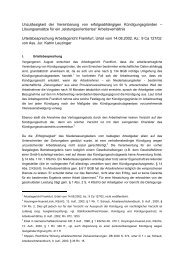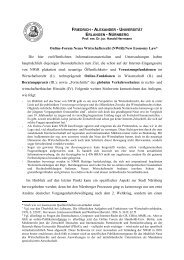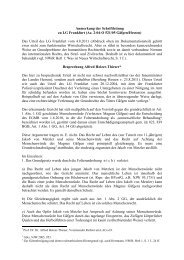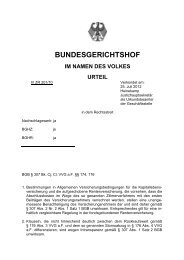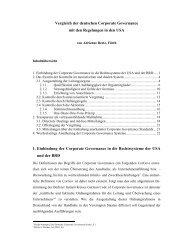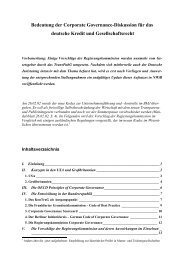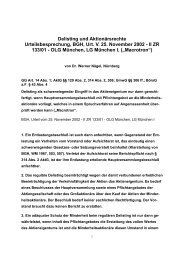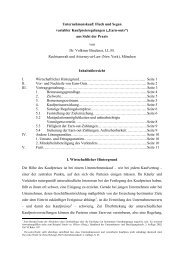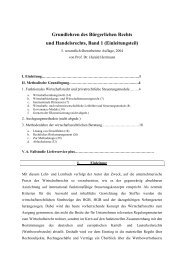Chapter 1: General Contract Law and Law of Sales Harald ... - Nwir.de
Chapter 1: General Contract Law and Law of Sales Harald ... - Nwir.de
Chapter 1: General Contract Law and Law of Sales Harald ... - Nwir.de
You also want an ePaper? Increase the reach of your titles
YUMPU automatically turns print PDFs into web optimized ePapers that Google loves.
2. Different Kinds<br />
The fundamental principle <strong>of</strong> the European <strong>and</strong> global contract law is the freedom <strong>of</strong> contract<br />
in threefold sense:<br />
- liberty <strong>of</strong> form<br />
- freedom to choose a contract partner<br />
- no governmental control <strong>of</strong> contractual contents<br />
Exemptions do not ab<strong>and</strong>on the principle:<br />
- credit guaranties § 766 BGB<br />
- <strong>and</strong> promises <strong>of</strong> donations have to be fixed in writing<br />
- purchases real estate have to be formally documented by a notary (§ 311b subsec. 1<br />
BGB)<br />
- sellers who enjoy monopoly power can be obliged to accept any contract partner, if<br />
they are ready to consent<br />
- contracts with illegal or immoral content are void or not enforceable in state courts.<br />
3. Concepts <strong>of</strong> Autonomy <strong>and</strong> Functions <strong>of</strong> Competitions<br />
What are the basic reasons for the three principles <strong>of</strong> freedom <strong>of</strong> contract? As mentioned<br />
earlier (introduction), there are even common Roman origins, which where improved <strong>and</strong><br />
adjusted to mo<strong>de</strong>rn business functions <strong>of</strong> competition. Here we focus on the concept <strong>of</strong><br />
contract conclusion, which, as will explained next, wilful <strong>of</strong>fer <strong>and</strong> acceptance are provi<strong>de</strong>d<br />
for. Both <strong>of</strong> the two <strong>de</strong>clarations do not become legally effective before the have been<br />
communicated to the other part <strong>of</strong> the contract in a way, that he was able to read it <strong>and</strong> to<br />
<strong>de</strong>ci<strong>de</strong>, to want the contract, or not. This has been explained by concepts <strong>of</strong> personal<br />
autonomy, <strong>and</strong> by freedom <strong>of</strong> contract conclusion. Mo<strong>de</strong>rn contract theory, however, analyses<br />
it in terms <strong>of</strong> competition, additionally.<br />
Functions <strong>of</strong> Competition:<br />
- Already in the 18 th century a Scotsman by the name <strong>of</strong> Adam Smith <strong>de</strong>tected the<br />
functions <strong>of</strong> competition <strong>of</strong> free business <strong>de</strong>cisions ma<strong>de</strong> by private enterprises (this<br />
was symbolised by the so called invisible h<strong>and</strong> in his famous book on the Theory on<br />
the Wealth <strong>of</strong> Nations).<br />
- Later economic scientists showed that the freedom <strong>of</strong> contract within a framework <strong>of</strong><br />
state guaranties <strong>of</strong> free or workable competition can work as an instrument <strong>of</strong> reaching<br />
the highest level <strong>of</strong> wealth <strong>of</strong> different nations (Franz Böhm, Hayek).<br />
- While the principle <strong>of</strong> free competition was enacted in the EEC-Treaty <strong>of</strong> Rome in<br />
1957, the legal acknowlegment <strong>of</strong> the freedom <strong>of</strong> contract was originally left to the<br />
national law. Later European law has promulgated many provisions which protect free<br />
competition in the internal European market by setting minimum st<strong>and</strong>ards <strong>of</strong><br />
contractual freedom <strong>and</strong> its limitations.<br />
- The most important directive <strong>of</strong> this kind is the one <strong>of</strong> 1993 on unfair terms in<br />
consumer contracts, which contains among others the famous provision <strong>of</strong> clear<br />
language (s. chart). We will see (below No. V.4) that this clarity provision mainly<br />
aims at competition purposes <strong>of</strong> transparent markets.<br />
2



